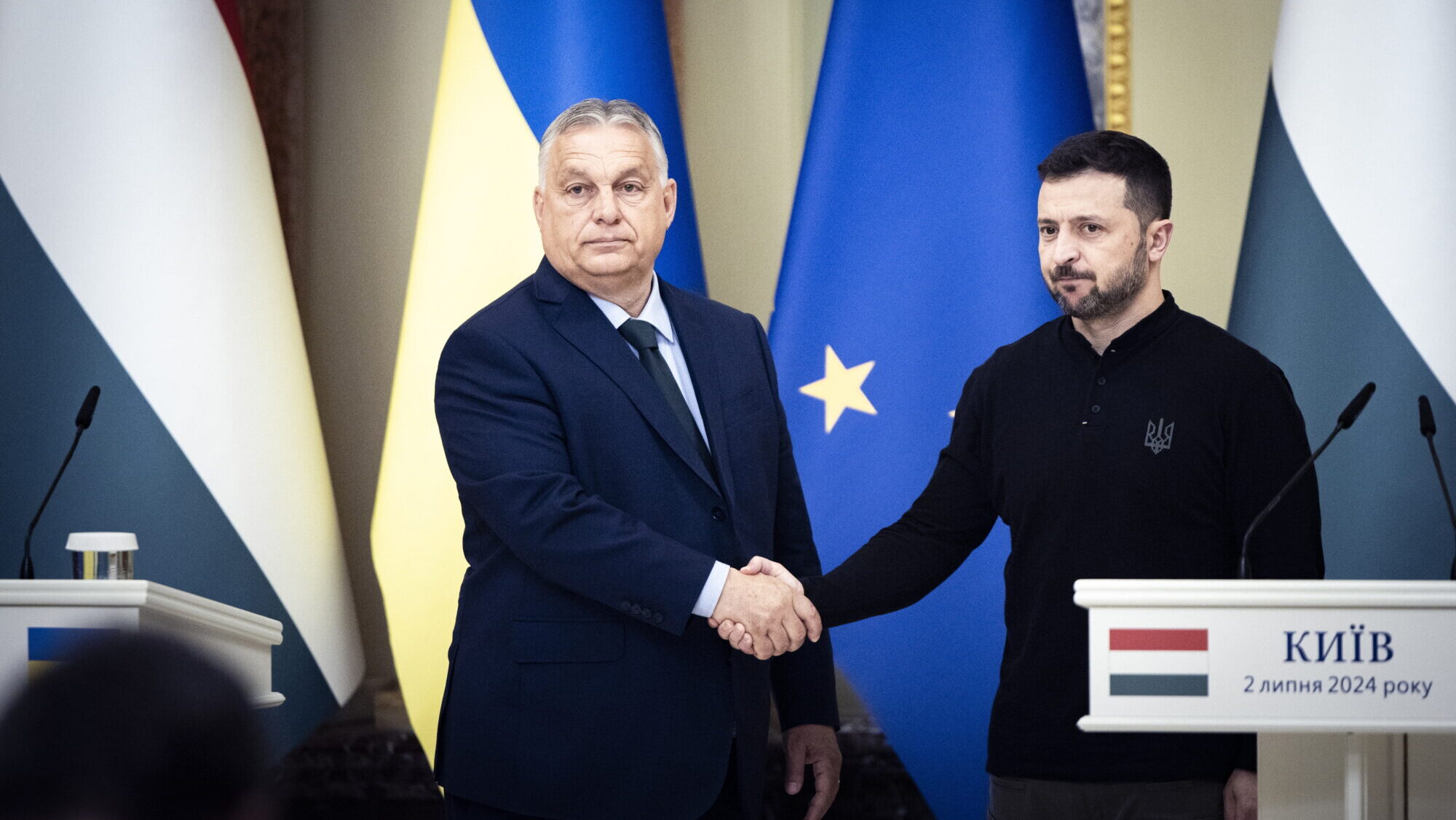
Hungarian Prime Minister Viktor Orbán and Ukrainian President Volodymyr Zelensky shake hands at the press conference held after their meeting in Kyiv on July 2, 2024.
Photo: MTI/Prime Minister’s Press Office/Zoltán Fischer
Hungarian Prime Minister Viktor Orbán urged Ukrainian President Volodymyr Zelensky to consider a ceasefire to pave the way for peace negotiations with Russia. The leaders of the neighbouring countries held talks in Kyiv on Tuesday, July 2nd, in what was an unexpected visit by the Hungarian PM.
My first trip after assuming the Presidency of the Council of the EU led me to Kyiv for a meeting with President @ZelenskyyUa. I assessed the possibility of a deadline-bound ceasefire, that could provide an opportunity to speed up peace negotiations. I will report my findings to… pic.twitter.com/TqPeDAvsoe
— Orbán Viktor (@PM_ViktorOrban) July 2, 2024
Relations between the two countries have been strained for many years, and this was Orbán’s first visit to the Ukrainian capital in twelve years. The prime minister stated that as leader of the country which holds the Presidency of the European Council, his first visit led to Kyiv “because the issue of peace is important not only for Ukraine, but for the whole of Europe.”
Hungary assumed the role of the rotating EU Presidency on Monday, which means it will guide the work of the Council and represent all member states in negotiations with other EU institutions for the next six months. “The EU has to guarantee the security and peace of Europe, and every one of our priorities will be interpreted within this framework,” pledged Hungarian EU Affairs Minister János Bóka at the unveiling of the presidency’s agenda a few weeks ago.
Hungary has been the only EU member state since the start of Russia’s invasion of Ukraine more than two years ago to decline sending weapons to Ukraine out of fear of prolonging the war. It has called for a ceasefire and peace talks instead, and has blocked a bunch of EU decisions that have aimed to support Ukraine militarily.
After holding talks with Volodymyr Zelensky on Tuesday, Viktor Orbán said he valued Kyiv’s push to promote Zelensky’s vision of peace at an international summit in June in Switzerland—which was held without the participation of Russia—and its aim to hold a second, follow-up summit later this year. However, stressed Orbán, “the rules of international diplomacy are slow and complicated,” therefore “I asked the president to think about whether we could reverse the order, and speed up peace talks with making a ceasefire first.” He added: “A ceasefire connected to a deadline would give a chance to speed up peace talks.”
Zelensky, who spoke before Orbán, did not respond to those comments. However, he thanked Hungary for attending the peace summit, and called the timing of the visit, after Hungary took over the EU presidency, symbolic. “This is a clear indication of our common European priorities, of how important it is to bring a just peace to Ukraine,” he said, urging European countries to maintain military support, as the army struggles to hold back Russian attacks.
I welcome Hungary’s Prime Minister @PM_ViktorOrban on his first visit to Ukraine in 12 years.
— Volodymyr Zelenskyy / Володимир Зеленський (@ZelenskyyUa) July 2, 2024
Today, we will discuss ways to bring a just and lasting peace closer. I thank Hungary for attending the Peace Summit and supporting its final communiqué. Our work in this format truly… pic.twitter.com/eLMfeC8hUn
The surprise visit was apparently agreed upon during last week’s EU summit, which Zelensky attended, during which the Hungarian PM and the Ukrainian President had a visibly heated exchange of words. Unlike many other European leaders, Orbán had not visited Kyiv since Russia invaded Ukraine. Hungary has criticised the EU’s decision to start accession negotiations with Ukraine, and its stance towards the war has caused tensions with its neighbour despite Hungary welcoming tens of thousands of Ukrainian refugees and sending humanitarian aid to the war-torn country.
However, relations had already soured years before the war. Since 2015, Ukraine has restricted the rights of its ethnic minorities, including the Hungarian community, through various laws, restricting the use of ethnic languages in schools and public spaces. The Hungarian minority—which lives in the westernmost region of Ukraine, Transcarpathia—is also increasingly threatened over its use of Hungarian flags and symbols and the singing of the Hungarian national anthem.
Though there have been bilateral talks to try and resolve these issues, no meaningful steps have been taken. However, Viktor Orbán stated there is now a chance for progress. He said he agreed with Volodymyr Zelensky to leave past disputes behind and work towards better bilateral relations, aiming for a comprehensive cooperation agreement with Ukraine and support for the modernisation of the Ukrainian economy.
🕊️ @PM_ViktorOrban in Kyiv: "Great discussions with President @ZelenskyyUa in Kyiv. Our focus: peace in Europe and strengthening Hungarian-Ukrainian relations."
— Zoltan Kovacs (@zoltanspox) July 2, 2024
🤝 PM Orbán stated that they agreed to leave past disputes behind and work towards better bilateral relations, aiming… pic.twitter.com/4YPVRtfxG0
The prime minister highlighted the importance of supporting the Hungarian community in Ukraine and welcomed the initiative to establish a Ukrainian school in Hungary, ensuring adequate educational facilities for Ukrainian refugees.
“The content of our dialogue today on all issues can become the basis for a bilateral document between our states, a document that will regulate all our mutual relations,” Zelensky said.
Regarding the meeting in Kyiv, Russian presidential spokesman Dmitry Peskov said “we don’t expect anything and it’s probably not up to us to comment on the issue.”
